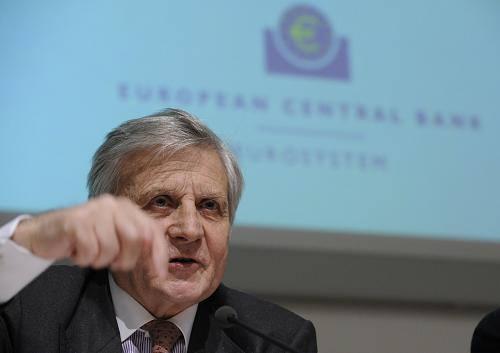The European Central Bank (ECB) on Thursday cut its benchmark rate by a record 75 basis points or 0.75 percentage points to help reactivate the slumping European economy.
The bank also readjusted its economic and inflation projections for 2009.
The rate reduction, made by the ECB's 21-head council at its regular out-of-town meeting in Brussels, lowered the bank's benchmark refinancing rate to 2.50 percent.
The move, the third in two months, was the deepest since the bank began in 2002 to take charge of the euro zone monetary policy. It had never cut more than 50 basis points before.
Since early October, the ECB has axed rates by a total of 175 basis points.
ECB chief Jean-Claude Trichet said a press conference after the meeting that the cut was based on "our analysis" of the economic health in the 15-nation euro zone and inflation situation and would contribute to financial stability.
 |
| European Central Bank (ECB) Chairman Jean-Claude Trichet gestures during a news conference at the end of an ECB Governors' Council meeting in Brussels on December 4, 2008. [AFP PHOTO] |
"Global and euro-area demand are likely to be dampened for a protracted period of time" as the world faces "an intensifying and broadening of financial turmoil" into next year, Trichet said.
The ECB chief said that the bank's governing council would continue to monitor very closely all developments.
"If new decisions are needed we will take new decisions, but I can't say anything else at this stage," Trichet said. "We continue to look very carefully at the situation of the market and the situation of the economy."
Economists had expected such a reduction as the economic picture is getting dimmer and inflation pressures are disappearing with the fall of oil and food prices.
Official figures showed that the euro zone economy entered recession in the third quarter and economic sentiment in the euro zone dipped to a 15-year low last month.
Eurostat said Thursday that the euro zone economy contracted by 0.2 percent in the third quarter of the year and entered recession because it was the second straight quarter with minus growth.
Economic sentiment in the euro zone dipped to a 15-year low last month.
Trichet also released the bank's latest projections of new inflation and economic growth, saying the euro zone economy would contract by 0.5 percent rather than grow by 1.2 percent as it had predicted in September.
This is the first time the ECB has ever predicted a contraction. In September, it forecast a 1.2 percent growth for 2009.
Concerning inflation, Trichet said it would slow to about 1.4 percent in 2009 from 3.3 percent this year. It predicted 2.6 percent in September.
"Overall, since our last meeting, evidence that inflation pressures are diminishing has increased," Trichet said. "Inflation rates are expected to be in line with price stability over the relevant policy horizon."
Inflation in the 15-nation eurozone fell drastically in recent months to 2.1 percent in November after it hit a record high of 4 percent in July due to rocketing oil and food prices.
The bank sets the target in inflation in the zone at 2 percent to keep economy stable.
Amid deep financial crisis, rates reduction were big around the world.
The Bank of England axed rates by 1.5 percent a month ago. The United States, China, Australia and Switzerland all repeated cuts recently.
The Bank of England Thursday cut 1.0 percentage point to 2 percent, while Sweden's central bank slashed its key interest rate by a record 1.75 percent to 2 percent.
(Xinhua News Agency December 4, 2008)